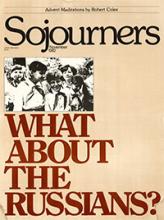Leaders of the nuclear freeze campaign are quick to concede that their effort is but a first step toward the ultimate goal of nuclear disarmament; a freeze would maintain nuclear weapons at an intolerable level of destructiveness. Everyone seems to agree that in the long run the solution to our nuclear madness requires a change of heart, a conversion, a turning away from force and violence and a turning toward some form of global dispute settlement. An indispensable prerequisite to any such conversion is a change in the way the Americans and Russians perceive each other. We must begin to see each other in a new light, freed from the fear and mistrust that have clouded our vision for so long.
Christians, of course, have grown up with exhortations to love our enemies, to turn the other cheek, to be peacemakers. Christ challenged us in words frequently unheeded but never quite forgotten: "You have heard the commandment, 'You shall love your neighbor but hate your enemy.' My command to you is: love your enemies, pray for your persecutors. This will show that you are children of your heavenly Father, for his sun rises on the bad and the good, he rains on the just and the unjust" (Matthew 5:43-44).
There is nothing praiseworthy in merely loving our own kind, our own family or friends or citizens. As Jesus says, anyone can love those who will love in return. But a follower of Christ is called to be made perfect, as God is perfect. Consequently, we are called to love not merely those on our street, in our workplace, or in our country, but even those whom we fear and distrust. Even those who will hate us in return. We must walk through life as Samaritans willing to stop and help even the injured Jew.
Read the Full Article

